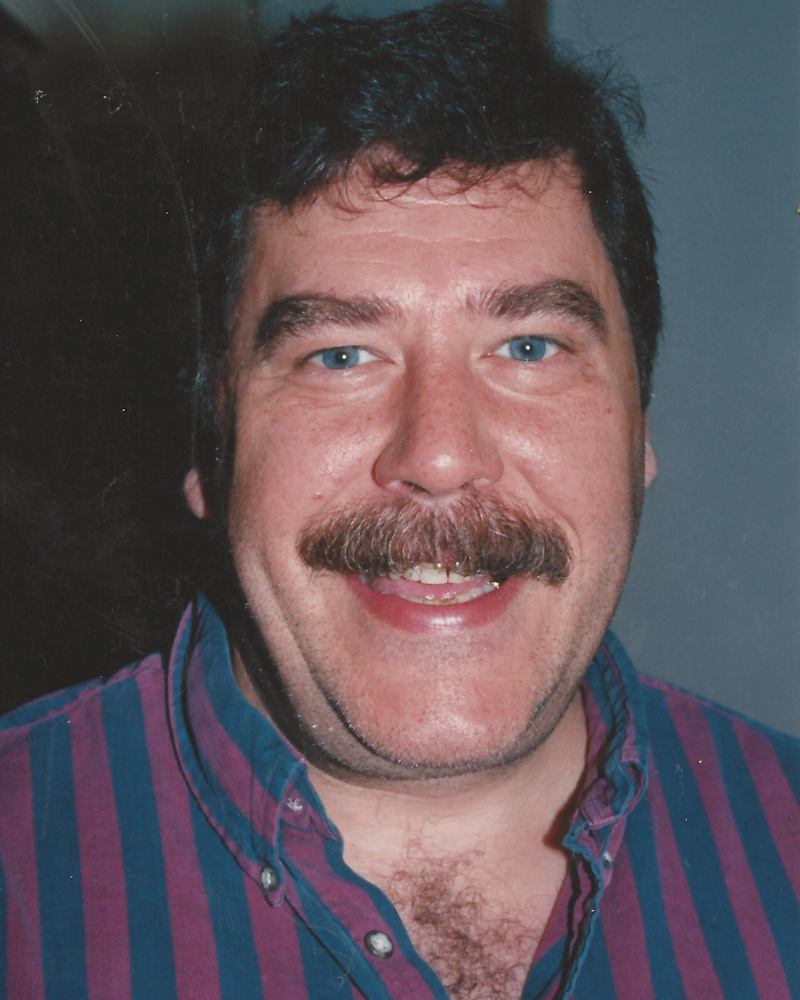
Dr. Rick Huskey
Biography
Dr. Rick Huskey, M.D., D.Min., M.Div., a co-founder of Affirmation: United Methodists for Gay, Lesbian, Bisexual and Transgender Concerns, was born May 19, 1950 in Minneapolis, Minnesota. Rick grew up in southeast Minneapolis, in the University of Minnesota community. At the beginning of junior high school, Rick's family moved to suburban Golden Valley. Rick's mother, a third-generation Methodist Christian, lead the family into attending the Golden Valley United Methodist Church, where Rick and his brother were confirmed. He attended the Robbinsdale School District, graduating from Robbinsdale Senior High School in 1968, with honors. Rick received a scholarship to attend St. Olaf College in Northfield, Minnesota, where he majored in religion, with minors in classics, philosophy and urban studies. He served as a secretary for the student body government.
While an undergraduate student at St. Olaf College in Northfield, Minnesota, Rick helped organize the Northfield Gay Liberation Front in 1971. After graduating cum laude from St. Olaf in three years, he began seminary studies at Garrett Theological Seminary in Evanston, Illinois. He completed the course work for his Master of Divinity Degree in two years.
While attending the United Methodist General Conference in Atlanta in May, 1972, as part of a seminary class, Rick met openly gay minister Gene Leggett from Texas. Rick and Gene quickly became colleagues and lobbied for acceptance of gay and lesbian clergy there. That General Conference adopted the infamous "we do not condone..." clause in the waning hours of the conference.

seminary graduation 1974Back at seminary in the fall of 1972, Rick was instrumental in the formation of Chicago Gay Seminarians and Clergy, along with fellow seminarians John Yoakam (Chicago Theological Seminary), David Sindt (McCormick Theological Seminary), David Blix (University of Chicago Divinity School) and Bill Krick (Garrett Theological Seminary). The following spring Huskey and Leggett traveled the East Coast together (in Huskey's Dodge Dart) and began building a network of gay and lesbian United Methodist clergy.
After receiving an M.Div. degree from Garrett and a D.Min. degree from Chicago Theological Seminary in 1974, Rick returned to Minnesota where he served as associate pastor at Good Samaritan UM Church in Edina. The following May, during a conversation about pastoral appointments with Bishop Wayne Clymer, Rick informed the bishop that he was gay and asked to begin a ministry with gay and lesbian Christians in Minnesota.
Huskey understood that his ministry was following in the footsteps of John Wesley, Methodism's founder, who in 1732 ministered to the "homosexual" Tommy Blair in Oxford's Bocardo Jail. This ministry was documented in Wesley's Oxford Diaries and confirmed by the diaries of other "Holy Club" members. Among the diary listings are John's private visitations, running errands, teaching religious catechism, and serving as legal defense in young Blair's "buggery" charge.
The bishop removed Huskey from his parish position, placing him on "voluntary location." Two years later, the Minnesota Annual Conference voted to put Huskey on "involuntary location," thereby ending his ministerial career in the church. Over 100 gay men and lesbian from the area participated in a "kneel-in" demonstration protesting Huskey's "de-frocking" during the ordination service at the conference session.
During this time, Rick continued to organize gay and lesbian United Methodists. In the summer of 1975, he, Steve Webster (Madison, Wisconsin), Ernie Reagh (New York) and Gene Leggett convened the first national meeting of gay and lesbian United Methodists. During this meeting at Wheadon UM Church in Evanston, this group named itself The United Methodist Gay Caucus.
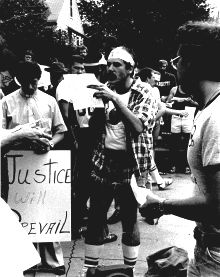
Rally Against Anita Bryant
Campaign in St. Paul, 1977 In the spring of 1976, Huskey and other members of the UM Gay Caucus met in Oklahoma City to make plans for a presence and participation in the 1976 General Conference in Portland, Oregon. During the General Conference, Rick was editor of "Blair's Blurbs" the daily newsletter of the Caucus and participated in discussions with delegates and visitors to the Conference as well as demonstrations and witnesses.
In the summer and fall of 1977, Huskey was one of the lead organizers of demonstrations against Anita Bryant's campaign to repeal the St. Paul (Minnesota) ordinance that banned discrimination in employment and housing.
Huskey continued his involvement in Affirmation, as the UM Gay Caucus was later renamed, and the Reconciling Congregation Program (founded in 1984) in the years following, including participating in the decision of his home church (Wesley UM. Church in Minneapolis) to become a Reconciling Congregation. However, more of his energy was poured into beginning a new ministry career--in medicine. He studied medicine in the Dominican Republic from 1978-1981 and did his clinical rotation at the University of California in San Francisco in 1980-81.
Subsequently, Huskey did post-graduate research and training at the University of California Davis Medical Center (1982-83), Hennepin County Chest Clinic and Minneapolis Indian Health Board (1984-87), the Veterans Administration Medical Center in Wilkes-Barre, Pennsylvania (1987-1991) and Albert Einstein Medical Center and The Philadelphia Geriatric Center, affiliated with Temple University Hospitals in Philadelphia (1991-93). In 1993, he began a geriatric medical practice in Washington, D.C., and worked in several clinics and hospitals there. In 2002, he became the Associate Medical Director and Chair of Geriatric Medicine at the Medlink Hospital and Nursing Center in Washington, D.C., and after three terms as Chair of the DC Board of Nursing Home Administration, he became the Emeritus Chairperson..
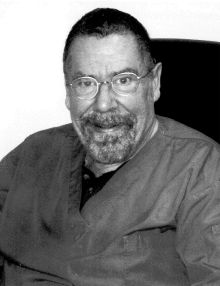
Rick at work, 2014 In 1988, Huskey arranged for the beginning of a United Methodist Gay and Lesbian Archives by donating his collection of papers and documents to the United Methodist Archives at Drew University. He has actively campaigned and worked to get the papers of other early United Methodist gay and lesbian leaders added to this collection.
In the mid 1990's, Huskey was named historian for Affirmation. In 1998 Huskey helped establish the National Gay and Lesbian Task Force's National Religious Leadership Roundtable. He represented Affirmation in the organizing and initial meetings.
In spring 2000 Dr. Huskey was editor of Affirmation's newsletter at the General Conference, "Table Manners," and was the medical contributor on aging gay men's health issues in "The Coming of Age," in Men Like Us: the GMHC Complete Guide to Gay Men's Sexual, Physical and Emotional Well-Being.
Rick lives in Martinsburg, West Virginia, and commutes to his practice in the District. He is the attending physician for over 200 seriously ill nursing home patients. Dr. Huskey cares for patients in their final, end-of-life status. He cares for the sickest elderly in the community, and incorporates home care visits into his practice. He yet expects to be ordained an Elder in the United Methodist Church as an open gay man with a call to ministry.
(This biographical statement was written by Rick Huskey with assistance from LGBTRAN staff Mark Bowman.)
Rick died on June 15, 2025. See below for more information.
Biography Date: October, 2003; rev. 2014
Additional Resources
Dr. Richard Huskey was set to be ordained as an elder in full connection at the Celebration of Life in Ministry worship service during the 2025 Annual Conference session in St. Cloud, Minnesota. Unfortunately, he suffered a medical event and was unable to attend. Immediately after Annual Conference, Bishop Lanette Plambeck traveled to the Geisinger Medical Center in Danville, Pennsylvania to ordain him. In 1977, while in process to become an elder, the Minnesota Conference discontinued his orders after Huskey disclosed he was gay. Following the 2024 General Conference's removal of the denomination's decades-long ban on gay clergy, Huskey requested to re-enter and complete the ordination process and, with recommendation from the Board of Ordained Ministry, was voted on and approved for ordination at the 2025 Minnesota Clergy Session. This letter from Bishop Lanette Plambeck tell the story of this extraordinary ordination.
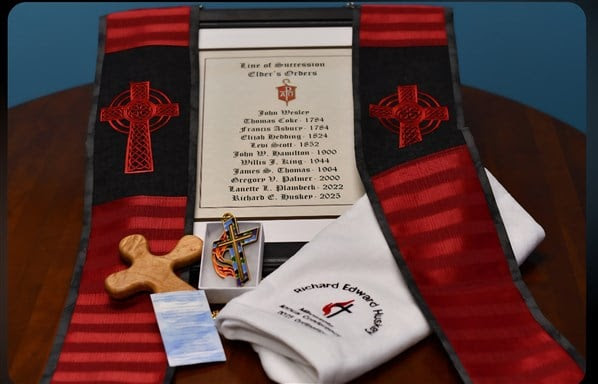 A stole, cross, certificate, and other items given to Rev. Dr. Richard Huskey as he was ordained on June 14.
A stole, cross, certificate, and other items given to Rev. Dr. Richard Huskey as he was ordained on June 14.
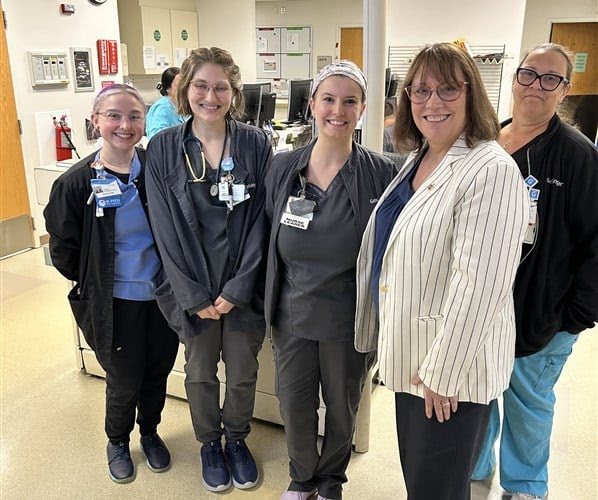 Bishop Lanette Plambeck with some of the medical staff who cared for Rev. Dr. Richard Huskey in his final days.
Bishop Lanette Plambeck with some of the medical staff who cared for Rev. Dr. Richard Huskey in his final days.
Rick Huskey was the editor of the Affirmation: United Methodists for LGBT Concerns newsletter, Table Manners, at the 2000 General Conference. He wrote this brief annotated autobiography, In Your Face with Grace, to introduce himself to that gathering:
In Your Face with Grace: A Brief Annotated Autobiography of Richard E. Huskey, M.D., D.Min., M.Div.
Table Manners May 3, 2000
Table Manners May 5, 2000
Table Manners May 6, 2000
Table Manners May 8, 2000
Table Manners May 9, 2000
Table Manners May 10, 2000
Table Manners May 11, 2000
Rick was the primary writer of the January-February 2004 issue of the With Love newsletter.
Profiles:
Archival Collections:
Tags
Methodist (UMC, United Methodist Church) | Leggett, Gene | Webster, Steve | Affirmation (United Methodist) | Activist (religious institutions) | Church Trials | Ordination/clergy | Huskey, Richard | EXHIBIT Rolling the Stone Away | EXHIBIT The UMC Gay Caucus
Citation
“Dr. Rick Huskey | Profile”, LGBTQ Religious Archives Network, accessed February 27, 2026, https://lgbtqreligiousarchives.org/profiles/rick-huskey.
Remembrances
“Rick died on June 15, 2025. He was a pioneer in challenging the heterosexist bigotry of the UMC, and for decades a witness to the importance of being “Out.” I met him and a handful of other gay clergy at the 1972 General Conference while we listened to the theologically problematic and hurtful testimony of those like Professor Albert Outler who argued that our love was “incompatible with Christian teaching” and that we must remain as second class citizens in the church where we had been raised and heard our call to ministry. As a delegate and a seminarian on the verge of ordination my self, I felt strengthened by knowing that I was not alone. Shaking at the knees I stood in the back row of the delegates to debate Outler in the waning hours of the Conference. It was a seminal event for me.
Bishop Plambeck of the Minnesota Annual Conference traveled to Rick’s bedside to ordain him as an Elder in the ministry of the UMC. Though unconscionably delayed until last its approval by the clergy session of the Minnesota Conference, Bishop Plambeck’s gracious act of acknowledging Rick’s gifts and graces is an emblem of a UMC finding itself.”
– as remembered by Morris Floyd on June 16, 2025
“Rick was my youth pastor at Good Samaritan Church in Edina. He always brought love and light into every place he went. He made me feel loved and listened to as a child. He was my first experience knowing a gay man. I was like 9. I didn’t really know what gay was but I adored him and think that it helped me form a more open mind in adulthood. I wish I could have said all of this and more to him. ”
– as remembered by Beth Johnson on April 29, 2021
Know Rick Huskey? Tell us your experience.
(All entries are reviewed by the LGBT-RAN office before posting.)